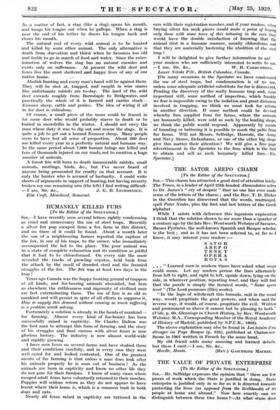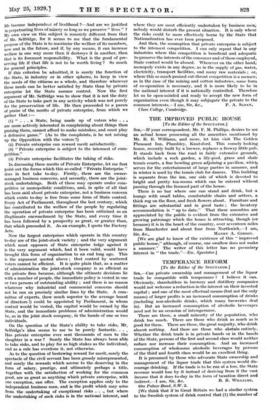THE VALUE OF PRIVATE ENTERPRISE [To the Editor of the
SPECTATOR.] SIR,—Mr. Selfridge expresses the opinion that " there are few Pieces of work which the State is justified in doing. State enterprise is justified only in so far as it is directed towards protecting the lives (as opposed from the livelihoods) of its people at home and abroad." Now how exactly can we distinguish between these two Items ?—At what stage does
life become independent of livelihood ?—And are we justified in perpetuating lives of misery so long as we preserve " lives " ? My own view on this subject is remotely different from that of Mr. Selfridge, for it seems to me that the fundamental purpose of the State is to maximise the welfare of its members, now and in the future, and if, by any means, it can increase
welfare in one way more than it destroys it in another, then that is its foremost responsibility. What is the good of pre- serving life if that life is not to be worth living ? So much for general principles.
If this criterion be admitted,_ it is surely the function of the State, in industry or in other spheres, to keep in view the needs of the citizens as a whole, and therefore wherever those needs can be better satisfied by State than by private enterprise let the State assume control. Now the first
argument of Mr.-Selfridge was to show that it is not the duty of the State to take part in any activity which was not purely for the preservation of life. He then proceeded to a paean of praise of the, merits of private enterprise, from which we gather that :- (1) " . . . a State, being made up of voters who . . are more actively interested in complaining about things than praising them, cannot afford to make mistakes, and must play "a defensive game." (As to the complaints, is he not mixing up the Opposition with the voters ?)
(2) Private enterprise can reward merit satisfactorily. (8) " Private enterprise is subject to the intensest of com- petition."
(4) Private enterprise facilitates the taking of risks.
In discussing these merits of Private Enterprise, let me first point out the forms which this so-called "Private Enterprise " does in fact take to-day. Firstly, there are the owner- managed business concerns, and secondly, there are the joint- stock undertakings. Both of these may operate under com- petitive or monopolistic conditions, and, in spite of all that has been said about private enterprise, not a business concern which exists to-day is free from some form .of State control.
Every Act of Parliament, throughout the last century, which has contributed to the welfare of the people by regulating the operation of private enterprise has been criticized as an illegitimate encroachment by the State, and every time it has been followed by a prosperity as great, or greater than, that which preceeded it. As an example, I quote the Factory Acts.
Now the largest enterprises which operate in this country to-day are of the joint-stock variety ; and the very argument which most opposers of State enterprise lodge against it is the very argument which, had it been valid, would have brought this form of organization to an end long ago. This is the argument quoted above ; that control by scattered voters cannot be efficient. It is quite plain that, as a matter of administration the joint-stock company is as efficient as the private firm because, although the ultimate decisions lie with a number of people, the immediate policy is vested in one or two persons of outstanding ability ; and there is no reason whatever why industrial and commercial concerns should not be run on precisely similar lines by the State. A com- mittee of experts, (how much superior to the average board of directors I) could be appointed by Parliament, in whom control would be vested, the capital would be owned by the State, and the immediate problems of administration would be, as in the joint stock company, in the hands of one or two individuals.
On the question of the State's ability to take risks, Mr, Selfridges idea seems to me to be purely fantastic. . . Has private enterprise ever sent thousands of men to the slaughter in a war ? Surely the State has always been able to take risks, and to play for as high stakes as the individual, and as a rule has overdone it, not otherwise.
As to the question of bestowing reward for merit, surely the spectacle of the civil servant has been grossly misrepresented, and surely the rewards which accrue to the deserving in the form of salary, prestige, and ultimately perhaps a title, together with the satisfaction of working for the common good, are as great as anything which private enterprise, with one exception, can offer. The exception applies only to the independent business man, and is the profit which may arise from the undertaking of exceptional risks . . ., but where the undertaking of such risks is in the national interest, and
where they are most efficiently undertaken by business men; nobody would disturb the present situation. It is only wherd the risks could be more effectively borne by the State that Nationalization has ever been proposed.
And then, the assumption that private enterprise is subject to the intensest competition. I can only repeat that in any industries where this competition is beneficial and adequate to preserve the interests of the consumer and of those employed, State control would be absurd. Wherever on the other hand; monopoly exists in any degree, as in the supply of gas, water, electricity, transport facilities, and many raw materials ; or, where this much praised cut-throat competition is a menace; as in the case of the mining and cotton industries, some form of co-operation is necessary, and it is more likely to be in the national interest if it is nationally controlled. Therefore let us be open-minded and ready to accept the new form of organization even' though it may subjugate the private to the









































 Previous page
Previous page